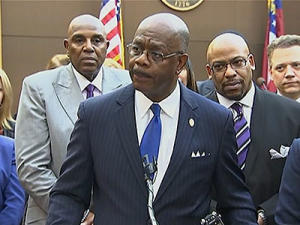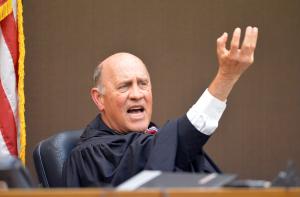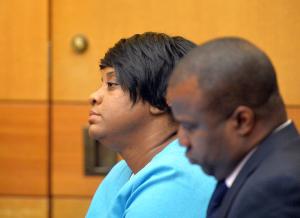One of Georgia's longest-ever criminal trials is over, and it's sending teachers to prison for up to 7 years
Eight former Atlanta educators have been sentenced to between one and seven years in prison for participating in a massive cheating ring, Reuters is reporting.
The criminal cheating trial in Atlanta could have sent the school teachers to prison for up to 20 yearsfor allegedly violating a law originally enacted to go after mobsters.
Prosecutors used Georgia's Racketeer Influenced and Corrupt Organizations (RICO) to accuse former principals, teachers, and administrators of trying to boost their bonuses by conspiring to artificially raise kids' test scores.
"There were thousands of children that were harmed in this thing," Judge Jerry Baxter said during sentencing, according to Reuters. Later, he added, "It’s like the sickest thing that’s ever happened to this town."
Baxter had urged the educators and prosecutors to try to negotiate a plea agreement so the teachers could have avoided jail, The New York Times reported Monday. Addressing the defendants, he reportedly said, “Somehow this morning it just came to me, you know, that the only reason that I’d send you to jail is for retribution."
Most of the defendants never made plea agreements, though.
Three of the 11 educators found guilty of RICO violations technically got 20-year sentences, but the judge said they'd only have to spend seven of those years in prison. (The rest could be on probation.) Two more educators will serve two years in prison and three will serve one year.
Two of the educators did make plea agreements: one will serve six months of jail on weekends and the other will avoid jail entirely but serve probation for five years.
The trial was one of the longest-ever criminal trials in Georgia's history. The jury deliberated for eight days befor reaching the guilty verdict for most of the defendants, local TV station 11 Alive reported.
"This has been a long, long, long journey," Judge Jerry Baxter reportedly said before the verdict. "I know everyone here probably has emotions they can't describe. I know I do. But I want to tell you — I've been down here 42 years ... and I've never seen a jury that was more diligent."
"Whatever your verdict is," he added, "I'll defend it until I die."
During closing arguments in the case, a lawyer for the defense suggested that it was a ludicrous abuse of power to bring racketeering charges against school teachers, as the Atlanta-Journal Constitution reported.
“Never have I seen the power of the state wielded like I have in this case,” defense lawyer Akil Secret reportedly said. “They are liars, cheaters and thieves who came up here to testify to save their own skins. This RICO stuff is overreaching. … It’s an abuse of discretion. Teachers? Racketeers? Really?"
While only a dozen ex-educators were on trial in Atlanta, dozens of teachers and administrators were initially charged and many have since pleaded guilty in exchange for their cooperation in exposing a scandal that captured national attention. A lawyer for one of the teachers on trial, Angela Williamson, previously suggested to Business Insider that her willingness to go to trial was a sign of her innocence.
"For the individuals that were falsely accused no level of plea reduction would work because their names have been associated with this scandal, and they want to clear their names," her lawyer, Gerald Griggs, told Business Insider last year.
(AP)Beverly Hall holds up her award after she was named the 2009 Superintendent of the Year. She was later indicted for cheating before dying of cancer in 2015.That scandal might not have been uncovered if it weren't for a pair of ambitious reporters at The Atlanta Journal-Constitution (AJC). Back in 2008, Heather Vogell, now a reporter for ProPublica, noticed unusual gains at some schools on a standardized test called the Criterion-Referenced Competency Test (CRCT). As she explained to the Huffington Post, the gains seemed unbelievable even to the naked eye.
The article she ended up publishing in December 2008 with computer-assisted reporting specialist John Perry is alarming. That initial article looked at unlikely gains at several schools, including Atherton Elementary School, where nearly 88% of the kids were living in poverty as of 2010. Half of the school's fifth-graders had failed the CRCT in the spring of 2008. The 32 kids were all forced to retake the test. Every single one of them passed, and 26 scored at the highest level, Vogell and Perry wrote. More from that article:
A miracle occurred at Atherton Elementary this summer, if its standardized math test scores are to be believed ...
No other Georgia fifth grade pulled off such a feat in the past three years. It was, as one researcher put it, as extraordinary as a snowstorm in July. In Atlanta.
Of course, Atherton was only a small part of the story. Vogell told HuffPost that the story prompted a number of teachers to contact her about rampant cheating at Atlanta's schools under the leadership of Superintendent Beverly Hall, who was indicted along with dozens of others. (Hall died of breast cancer earlier this month, before she could take the stand at trial.)
While the AJC kept digging into the story, the state of Georgia conducted its own investigation, which in 2011 uncovered cheating at 44 schools that involved at least 178 educators, according to The New York Times.
That investigation relied largely on a third-grade teacher named Jackie Parks, who admitted to state investigator Richard Hyde that she had sat with six teachers in a windowless room to change test answers the week of state testing.
Parks agreed to wear a wire to school and record her fellow teachers.
"During his 35 years as a Georgia state investigator, Richard Hyde has persuaded all sorts of criminals — corrupt judges, drug dealers, money launderers, racketeers — to turn state’s evidence, but until Jackie Parks, he had never tried to flip an elementary school teacher," The Times reported in March 2013. "It worked."
"What happened to our children, it was sad, it was ugly," prosecutor Clint Rucker told the jury, according to the AP. "They were cheating and it's not right and I'm asking y'all to do something about it."
Atlanta schools cheating case judge keeps word on sentences
ATLANTA (AP) — True to his word, a judge showed mercy to former Atlanta public school educators who accepted responsibility for their role in a widespread conspiracy to inflate student scores on standardized tests. Those who refused to admit guilt and agree to other conditions set by prosecutors, he treated much more harshly.
Fulton County Superior Court Judge Jerry Baxter had delayed sentencing by a day and encouraged the former educators to negotiate deals with prosecutors. He made it clear Monday they would face prison time if they took a chance and let him sentence them. But only two of them took deals.
On Tuesday, Baxter sentenced the eight who rejected deals to between one and seven years in jail, despite their lawyers' pleas for probation and community service. They are expected to appeal and will be free on bond while the appeals are pending.
"All I want from any of these people is just to take some responsibility, and they refuse," Baxter said, his frustration clear in clashes with defense attorneys.
The two who struck deals were rewarded: Baxter gave a former teacher a 7 p.m. to 7 a.m. curfew at home for one year and gave a former testing coordinator six months of weekends spent in jail. They'll also serve five years on probation.
A state investigation found that as far back as 2005, educators from the 50,000-student Atlanta school system fed answers to students or erased and changed answers on tests after they were turned in. Evidence of cheating was found in 44 schools with nearly 180 educators involved, and teachers who tried to report it were threatened with retaliation.
In 2013, 35 educators were indicted on charges including racketeering, making false statements and theft. Many pleaded guilty before the trial, and some testified at the months-long trial. The jury acquitted one of the 12 former educators who went to trial and convicted the other 11 of racketeering.
"This was very, very remarkable, to have the judge sort of give the defendants a second chance," said University of Georgia law professor emeritus Ron Carlson. "The thing that maybe was a little surprising was the reticence of the defendants to step forward and do that."
Bob Rubin, who represented former elementary school principal Dana Evans, said the decision to turn down the deal wasn't hard for his client.
"She couldn't say something that wasn't true," he said, referring to the insistence by the prosecution and the judge that the negotiated deals include an acceptance of responsibility.
Those who took the deals — former teacher Pamela Cleveland and former testing coordinator Donald Bullock — waived their right to appeal. They also agreed to accept responsibility, reading aloud a statement apologizing to students, parents and the court.
Baxter eventually agreed to let all the defendants qualify for first-offender status, after initially denying it for some. That means their records can be wiped clean once they've completed their sentences.
Misconduct by educators rarely ends up in criminal court, and the fact that so many of them received jail time sends a strong message, Carlson said.
"These sentences will send shockwaves through the world of education," he said, adding that he believes it will be nearly impossible going forward for an administrator to pressure a teacher to cheat.
Baxter reserved the harshest punishment for three regional directors who oversaw multiple schools and were "at the very top of this scandal." For them, Baxter went above prosecutors' recommendations of three years imprisonment. He ordered them to serve seven years in prison with the remainder of a 20-year sentence on probation, 2,000 hours of community service and a $25,000 fine.
During sentencing, Baxter called the cheating "pervasive."
"It's like the sickest thing that's ever happened in this town," he said.
Former Superintendent Beverly Hall was among those indicted, but she did not stand trial because her lawyers argued successfully that she was too sick. She died last month from complications of breast cancer.
The 11th convicted former educator had a baby over the weekend and will be sentenced later.
District Attorney Paul Howard told reporters after sentencing that his goal all along was to get the community to pay attention to what happened in Atlanta schools and to make sure the affected children get some relief.
"We believe the loss that we suffered was a community loss," Howard said.
He said his office is in talks to create the Atlanta Redemption Academy, which he said will seek to identify and assess the students who were hurt by the cheating scandal and to provide solutions for them, including help getting a job or GED training or assistance getting into college.
Bernice King, daughter of slain civil rights icon Martin Luther King Jr., and Rev. Gerald Durley, a former administrator at Clark Atlanta University and the Morehouse School of Medicine, have been tapped to head the board of the planned academy, Howard said.



